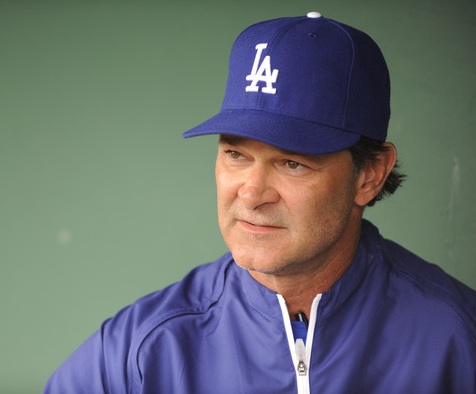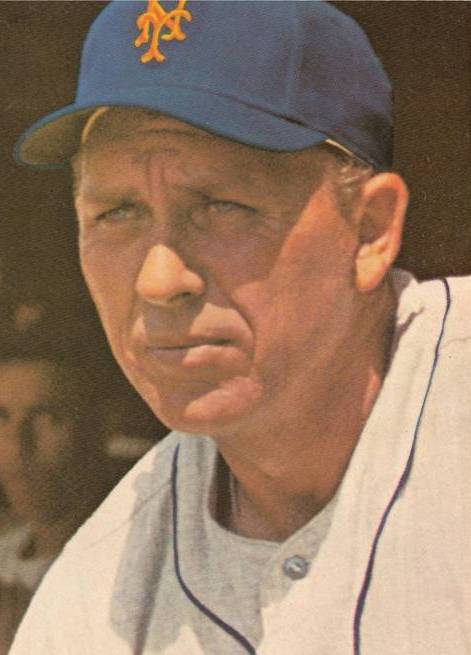2011 Top Managers of the Year
 Baseball Blogger’s Alliance members participate in a variety of polls the organization conducts throughout the year. With the end of the 2011 regular season, it’s time for me and my colleagues to cast our votes for five outstanding individual performers in several significant categories. In this post, I will state my choices for the Connie Mack Award, given to the top Manager.
Baseball Blogger’s Alliance members participate in a variety of polls the organization conducts throughout the year. With the end of the 2011 regular season, it’s time for me and my colleagues to cast our votes for five outstanding individual performers in several significant categories. In this post, I will state my choices for the Connie Mack Award, given to the top Manager.
A large part of a Manager’s challenge is to get the most out of the talent he has been given. However, the key word in the previous sentence, with a tip of the hat to Yogi Berra, is “large part.” A team’s circumstances will dictate various aspects of his challenge. Since no two teams are exactly alike, each Manager’s challenge is uniquely his own. Those of you who read my posts regularly know how fascinated I am with the history of the game, and that I try to work it into my posts. In thinking about this award, I surveyed some of the baseball history I have lived through and came up with two managerial performances I would like to share with you.
When Bob Lemon took over the 1978 New York Yankees in the middle of the season, his challenge was to set a quiet tone of professionalism, maintain a low profile and let his talented, veteran players get their work in and win ball games. Prior to his appointment, the Yankees had gone 52-42 for a .532 winning percentage. Under Lemon, they went 48-20, delivering a lusty .706 winning percentage and a World Championship.
Gil Hodges piloted the 1969 New York Mets to a 100-win season and a World Series Championship. He accomplished this through skillful use of his young pitchers, employing his entire roster through the platoon system and by disciplining his players when necessary. What makes this all the more amazing is that during the previous season the team finished in ninth place with a record of 73 wins and 89 losses. It’s a classic example of what can occur when we don’t listen to what people say about us. Many people said the Mets would wilt, that they owed their success solely to the slumping Cubs, and that they were playing over their heads. What mattered most is that Gil Hodges set a winning tone, and the Mets responded. I will never forget the 1969 Miracle Mets.
**************************************************
 My top choice for the 2011 Connie Mack Award is Kirk Gibson, Manager of the Arizona Diamondbacks. Under his leadership, a team that came in last place in its division with a record of 65 wins and 97 losses in 2010, made a complete turnaround to win the NL West division this year, playing to a winning percentage of .580 that resulted in 94 wins and 68 losses. As with most organizations, no one person is solely responsible for its success, and many other people helped. General Manager Kevin Towers turned the roster over, giving Gibson a fresh hand from the deck. An all-star galaxy of coaches including Batting Coach Don Baylor, Pitching Coach Charles Nagy, First Base Coach Eric Young, Third Base Coach Matt Williams and Bench Coach Alan Trammell had a huge impact. The ultimate responsibility, however, rests with the Manager. I’m certain his presence alone was an integral part of his success. Can you imagine not playing hard and then returning to the dugout knowing his visage was waiting for you there? Every one knows he’s the man who, inserted in the game at a key moment as a pinch hitter, limped up to the plate in the first game of the 1988 World Series and slugged a home run for the win. Much lesser know but still part of his aura was the day a pitcher’s wild fastball struck him on his face, and he did not fall down. I know this happened; I saw it.
My top choice for the 2011 Connie Mack Award is Kirk Gibson, Manager of the Arizona Diamondbacks. Under his leadership, a team that came in last place in its division with a record of 65 wins and 97 losses in 2010, made a complete turnaround to win the NL West division this year, playing to a winning percentage of .580 that resulted in 94 wins and 68 losses. As with most organizations, no one person is solely responsible for its success, and many other people helped. General Manager Kevin Towers turned the roster over, giving Gibson a fresh hand from the deck. An all-star galaxy of coaches including Batting Coach Don Baylor, Pitching Coach Charles Nagy, First Base Coach Eric Young, Third Base Coach Matt Williams and Bench Coach Alan Trammell had a huge impact. The ultimate responsibility, however, rests with the Manager. I’m certain his presence alone was an integral part of his success. Can you imagine not playing hard and then returning to the dugout knowing his visage was waiting for you there? Every one knows he’s the man who, inserted in the game at a key moment as a pinch hitter, limped up to the plate in the first game of the 1988 World Series and slugged a home run for the win. Much lesser know but still part of his aura was the day a pitcher’s wild fastball struck him on his face, and he did not fall down. I know this happened; I saw it.
Upon signing as a free-agent with the Los Angeles Dodgers, Kirk Gibson, in talking about himself said, “I play hard, I play hurt, and I hate to lose.” I’m certain he brought that attitude to his Managerial duties with the Diamondbacks and imparted it to his players. As the season unfolded, his players got more aggressive. Talented players performed at a higher level. They began believing in themselves and hustled their way to a winning record. Winning became a habit. A look at the team’s 2011 monthly record shows the improvement:
|
Month |
Record |
Percentage |
|
March/April |
11-15 |
.423 |
|
May |
19-10 |
.655 |
|
June |
14-13 |
.519 |
|
July |
15-11 |
.577 |
|
August |
19-10 |
.655 |
|
September |
16-9 |
.640 |
For his outstanding job as Manager of the 2011 Arizona Diamondbacks, Kirk Gibson is richly deserving of this award.
*************************************************
 Tampa Bay Rays Manager Joe Maddon is my second choice for Manager of the Year. The Rays play in a small market whose revenue do not permit them to compete for the game’s most talented players in the annual free agent market. Worse, when their own players become free agents, they can’t afford them either. Such was the case during the 2010-2011 off-season, when there was an exodus of talented players such as Left Fielder Carl Crawford, First Baseman Carlos Pena and Reliever Rafael Soriano. Maddon slowly and patiently worked in his new players, many of them products of the Rays’ minor league system, and convinced them they could win. The result was a team that played with dogged determination every time out. The Rays won the wild card on the last night of the season, when trailing by seven runs in the eighth inning against the New York Yankees, they rallied for seven runs to send the affair into extra innings, and then won it in the bottom of the twelfth. Maddon is a strong motivator who relates well to his players.
Tampa Bay Rays Manager Joe Maddon is my second choice for Manager of the Year. The Rays play in a small market whose revenue do not permit them to compete for the game’s most talented players in the annual free agent market. Worse, when their own players become free agents, they can’t afford them either. Such was the case during the 2010-2011 off-season, when there was an exodus of talented players such as Left Fielder Carl Crawford, First Baseman Carlos Pena and Reliever Rafael Soriano. Maddon slowly and patiently worked in his new players, many of them products of the Rays’ minor league system, and convinced them they could win. The result was a team that played with dogged determination every time out. The Rays won the wild card on the last night of the season, when trailing by seven runs in the eighth inning against the New York Yankees, they rallied for seven runs to send the affair into extra innings, and then won it in the bottom of the twelfth. Maddon is a strong motivator who relates well to his players.
**************************************************
 My third choice for Manager of the year is Don Mattingly, Manager of the Los Angeles Dodgers. He authored a turnaround similar to the one Kirk Gibson accomplished with the Diamondbacks. The Dodgers record in the first half of the season was 41 wins and 51 losses; in the second half it was 41 wins against 28 losses. What’s more, this was achieved despite the turmoil created by the ongoing, nasty divorce of Frank and Jamie McCourt, each of whom is claiming ownership of the Dodgers. What’s more, Major League Baseball appointed former Texas Ranger President Tom Schieffer of the Texas Rangers to oversee the club’s finances and daily operations. In spite of this commotion, perhaps intensified by the team’s presence in one of the nation’s largest markets, Mattingly kept his players focused on the field, and the results show.
My third choice for Manager of the year is Don Mattingly, Manager of the Los Angeles Dodgers. He authored a turnaround similar to the one Kirk Gibson accomplished with the Diamondbacks. The Dodgers record in the first half of the season was 41 wins and 51 losses; in the second half it was 41 wins against 28 losses. What’s more, this was achieved despite the turmoil created by the ongoing, nasty divorce of Frank and Jamie McCourt, each of whom is claiming ownership of the Dodgers. What’s more, Major League Baseball appointed former Texas Ranger President Tom Schieffer of the Texas Rangers to oversee the club’s finances and daily operations. In spite of this commotion, perhaps intensified by the team’s presence in one of the nation’s largest markets, Mattingly kept his players focused on the field, and the results show.
****************************************************
Who was Connie Mack? Some of my readers are relati vely new to baseball, and may not have heard of “Mr. Mack,” as he was called. Born Cornelius Magillicuddy, Mack was a catcher during the pioneering period of organized baseball, playing in eleven seasons from 1886 to 1896. In 1901 he assumed ownership of the Philadelphia Athletics, managing them for a staggering fifty-three seasons. Everything about this accomplishment was record-setting, including the 7,878 games managed, the 3, 776 games he won, as well as the games he lost, all 4, 025 of them. Not only was Mack a gentleman, but he was also a gentle man. I never read or heard of an incident where he lost his composure or temper. If he had to discipline a player he waited until the game was over and then did so privately, in his office. His teams played in eight World Series and won five of them. I’m sure it wasn’t easy competing against the New York Yankees of that era. Back then there were eight teams in a league, with 154 games per season. That meant 22 games against each team, eleven at their yard and eleven at yours. Perhaps his greatest accomplishment came in the late 1920’s and early 1930’s when he put together a team that was on a par with and for a few years even greater than the Yankees, as this chart shows:
vely new to baseball, and may not have heard of “Mr. Mack,” as he was called. Born Cornelius Magillicuddy, Mack was a catcher during the pioneering period of organized baseball, playing in eleven seasons from 1886 to 1896. In 1901 he assumed ownership of the Philadelphia Athletics, managing them for a staggering fifty-three seasons. Everything about this accomplishment was record-setting, including the 7,878 games managed, the 3, 776 games he won, as well as the games he lost, all 4, 025 of them. Not only was Mack a gentleman, but he was also a gentle man. I never read or heard of an incident where he lost his composure or temper. If he had to discipline a player he waited until the game was over and then did so privately, in his office. His teams played in eight World Series and won five of them. I’m sure it wasn’t easy competing against the New York Yankees of that era. Back then there were eight teams in a league, with 154 games per season. That meant 22 games against each team, eleven at their yard and eleven at yours. Perhaps his greatest accomplishment came in the late 1920’s and early 1930’s when he put together a team that was on a par with and for a few years even greater than the Yankees, as this chart shows:
|
Year |
Athletics |
Yankees |
|
1926 |
3rd |
1st |
|
1927 |
2nd |
1st |
|
1928 |
2nd |
1st |
|
1929 |
1st |
2nd |
|
1930 |
1st |
3rd |
|
1931 |
1st |
2nd |
|
1932 |
2nd |
1st |
There are many other things I can say in regard to Mr. Mack, and as a man of significant historical baseball importance, one day I will. However, these comments will be the subject of a future post. For now, I’ll turn my attention to the top rookie of the 2011 baseball season, which will be the subject of my next post.



Comments